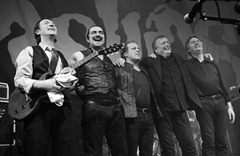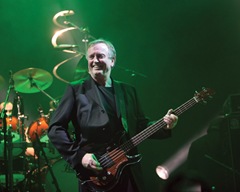Still going strong: the Horslips
 Thirty years have passed since the Horslips introduced their unique brand of ‘Celtic rock’, but the band is still playing packed out venues across Europe. Meadhbh Monahan speaks to bass player and vocalist Barry Devlin about their comeback.
Thirty years have passed since the Horslips introduced their unique brand of ‘Celtic rock’, but the band is still playing packed out venues across Europe. Meadhbh Monahan speaks to bass player and vocalist Barry Devlin about their comeback.
Described in the 1970s and 80s as “the band that defined a generation,” 62-year- old Barry Devlin reflects that the Horslips were in fact “a band that were defined by a generation.”
The legendary five-man ensemble, who made Irish traditional music ‘cool’, played what they thought would be their final gig in Belfast’s Ulster Hall in 1980, after 10 years of touring almost every dancehall and concert arena in Ireland.
With hits such as ‘Derag Doom’, ‘Trouble with a capital T’ and ‘The man who built America’, the band became infamous for their blend of Irish traditional and rock. Their songs re-tell Irish myths and legends while giving them a unique twist. For example ‘Derag Doom’ is based on a polka called ‘O’Neill’s Cavalry March’.
Devlin explains the idea behind their music: “We were very much of a particular time and place.” He recalls that the 1970s was “an interesting time in music.” The Beatles had introduced the concept of fusion. The band liked that idea so they fused rock and traditional. The Horslips regarded themselves as “a prog-rock band.” He continues: “We didn’t think of ourselves as a trad band and I suppose we should have been careful about how we allowed ourselves to be defined. We should have said very clearly: ‘We are not a trad band; we don’t want to change trad music’.”
Devlin concedes that at the time the band were willing “take any praise [it could] get, so suddenly we were the new traditional.” He says: “In some ways that haunted us” because traditional musicians didn’t like what they heard. Ultimately, Devlin believes that the Horslips were “defined by what [they] started.”
Small towns in the 1970s had never seen anything like the Horslips, who arrived wearing leather jackets, accompanied by roadies and big lorries. He feels that their music “was an affirmation of a different world that, at the same time, was Irish.”
The decision to break-up came in 1980, “partly because we’d been on the road for 10 years without a break,” but also because they felt there was nowhere else go musically. “After 10 years we couldn’t turn around and say: ‘We’ve nothing to do with Irish music, we are a pop band,’” Devlin recaps. In addition, whilst they didn’t break-up to get married, Devlin notes that “it’s interesting that as soon as we broke up everyone got married.”
Families and alternative careers ensued for the five members: Devlin, Johnny Fean, Jim Lockhart, Eamon Carr and Charles O’Connor.
Together again
The decision to re-group in 2000 came largely from nostalgic reasons. “While we were playing the jury would have been out on the musical worth of what it is we were doing,” Devlin recounts.
“People always speak well of the dead,” he adds. “As soon as we were safely in the grave our music was represented as something to be awed, something extraordinary [and] that was great.”
Devlin is enjoying being back on stage “What’s been interesting is that what we’ve done has stood up; people have liked it,” he comments.
The band have been writing new material but mostly performing their famous early material. Contemplating on where they go from here, Devlin says: “There’s an element, even for us, of revisiting something that is fossilised in a sense. It’s an interesting conundrum: should we do more or should we get back in the grave again?” He jokes: “At our age, any exit strategy could sometimes involve dying.”
His happiest memory from the Horslips long career is that night on 5 December 2009 when the band came together to perform their Dublin reunion gig in the O2 (they also played the Odyssey on 3 December).
“We were in the dressing room saying: ‘We are still alive, we are still together, we are still able to play’,” Devlin reveals. They then wished each other good luck saying: “break a hip!”
 What made that evening extra special, as well as the fact that it brought their faithful audience back together again, was that Devlin was able to share it with his three children (Paul, Jack and Katie), who “weren’t even thought about” when he was first on stage in the 1970s. A large party was held at the Devlin household in Dalkey and two buses transferred young cousins and friends – the new generation – to the gig.
What made that evening extra special, as well as the fact that it brought their faithful audience back together again, was that Devlin was able to share it with his three children (Paul, Jack and Katie), who “weren’t even thought about” when he was first on stage in the 1970s. A large party was held at the Devlin household in Dalkey and two buses transferred young cousins and friends – the new generation – to the gig.
“At this age you tend to only see people at funerals so this was getting to see them at a happy occasion,” Devlin smiles.
The audience is very important to the Horslips as it largely consists of a very dedicated following. “We have a fantastic relationship with our audience,” Devlin says. He refers to it as “a community” and likens it to a football squad whereby and “we mostly play ourselves but we have about 20 people on the bench who we could pick and they’d probably be able to play the tune better!”
He adds: “In the 70s we spent an awful lot of time coming down off stage and instead of chatting up girls, we’d have been saying to young fellas: ‘No we [aren’t] doing a lot of drugs and yes you should do your Leaving Cert.’”
However, they also find that people who haven’t heard them before like what they hear and are gathering a new following. For example, the band received a good reception to their set at the London Féis in Finsbury Park in June.
A changed Ireland
Ireland has changed “beyond all recognition”. Devlin states: “There must be some sort of legend which says that when Ireland is on its knees, the Horslips will come and play again because when we were playing first the place was bent to the ropes.”
The Troubles was “grotesque”, according to Devlin, who used to think: “Jesus, who’s that?” when a car drove up behind them on a dark night on a country road.
The Horslips were lauded for attracting Catholics and Protestants to their concerts. “We were a rock band and although what we were talking about was Ireland in megalithic times, we defined ourselves as liberals.”
Before the Miami showband massacre, which saw three of the band members murdered by the UVF in July 1975, there was a presumption that “you didn’t shoot the piano player.” However, after that the band realised that “anything could happen” and they had “a few close shaves in their time.” Things are “infinitely better” now but there are still “currents” that Devlin hates to see. “I don’t think we’ll ever get rid of that in the North,” the County Tyrone native concludes.
The country has also changed musically. “When we started there was really ourselves, Rory Gallagher and Thin Lizzy,” Devlin contends. Now, “there’s a fantastic quality of bands around [such as] The Script, The Coronas, Ham Sandwich, and Agitate the Gravel.”
Devlin doesn’t know how long the Horslips will continue to perform but concludes that his band mate
s “are all funny, smart and kindly” and that “it’s a real privilege” to still be able to perform to their dedicated fans.





